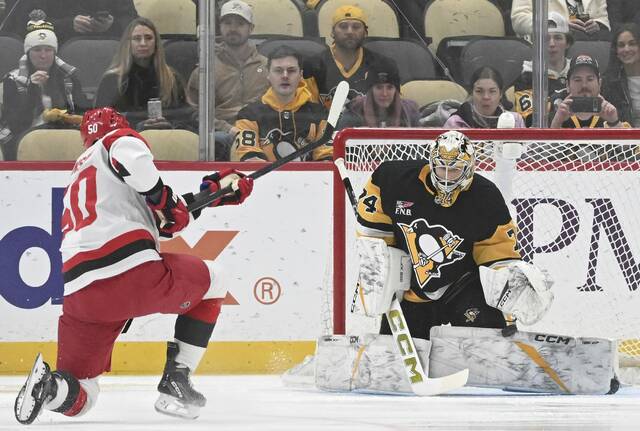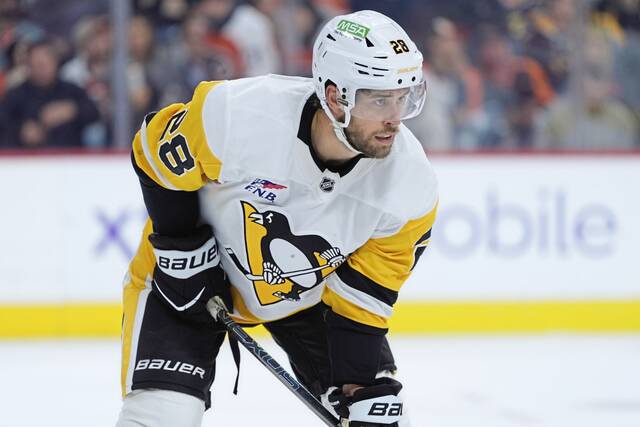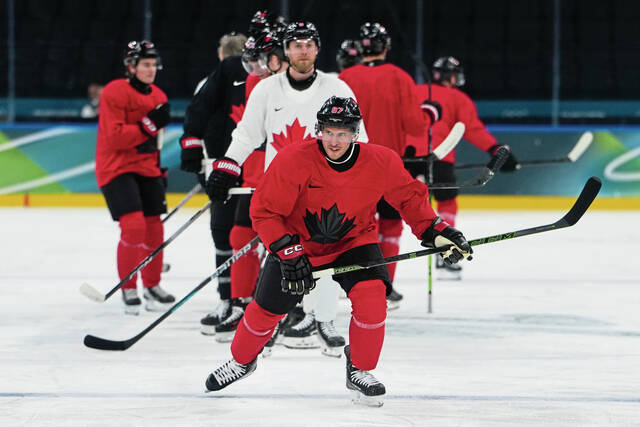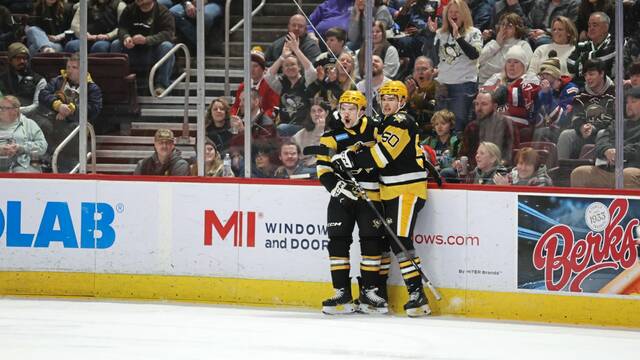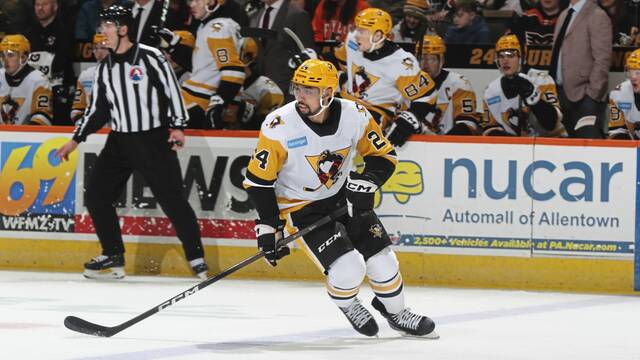NASHVILLE, Tenn. — Hal Gill always will stand out.
At 6-foot-7, how can he not?
But in his second career, he is something of a fish out of water.
After all, the native of Concord, Mass., and Providence graduate still has a slight New England accent, and he’s broadcasting hockey in the Southeast.
The former Pittsburgh Penguins defenseman, who had a bruising 16-year career as a physical presence, is three years into his vocation as a radio color commentator for the Nashville Predators.
“After I retired, I went through, kind of — I don’t want to call it soul searching — but figuring out what you want to do,” Gill, who retired following the 2013-14 season, said. “Nothing compares to playing hockey. You can coach. You can do broadcasting. It’s nothing like playing hockey.”
The Predators were one of six teams Gill played for including the Pittsburgh Penguins, Boston Bruins, Toronto Maple Leafs, Montreal Canadiens and Philadelphia Flyers. Despite only 55 games over two seasons with the Predators toward the end of his career, he found a connection.
Gill wanted to remain in the sport. After a brief stop with the Florida Panthers in a player development role, he cold-called the Predators.
“I called the Nashville (Predators) and said, ‘Hey, is there anything open I could do with the team?’ And radio was open. Kind of fell into it that way.,” Gill said. “Did some broadcasting in Boston with NESN. Got my feet wet a little bit. Decided to roll with it. Moved my family down here, and this is my third year.”
Finding that next chapter was a bit of a challenge. Gill considered working in the financial sector like former Penguins forward Craig Adams, who is a financial advisor with Merrill Lynch, before rejoining the Predators.
“I talked to Pittsburgh about player development,” the 44-year-old Gill said. “There was a lot of guys working at that time, so they were kind of full. You kind of go through that process. I talk to Adams still. He’s a worker. He’s not going to sit and relax. That’s not his type. He needed to get out there and tackle the business world. I wanted to be around hockey so I came back.”
Gill, who lumbered around the ice at 243 pounds at times during his career, observes a different — faster — game than when he broke into the NHL in 1997.
Still, he insists the sport’s base essence hasn’t been altered much.
“It’s funny because I always say it’s changed so much,” Gill said during a Dec. 27 interview with the Tribune-Review when the Penguins played in Nashville. “But at the core root of it, you still have to play defense. Everyone talks about offensive defensemen. You have to be a puck-moving guy. You have to be in the rush. You have to do this. Eventually, you have to play (defense). The game has changed. It’s not as physical in the corners, but it still gets physical at the net. You can see the guys that come in, they need to learn the real game eventually. This time of year, everything is a little different. Once it gets to the playoffs, then hockey goes back to what I saw it as and what I played.”
Gill enjoyed a prolonged NHL career despite rule changes designed to speed up the game. The most dramatic of those came after the NHL’s lockout of 2004-05.
“I always laugh because every rule that was put in was really designed to get me out of the game, my type of player, a defensive defenseman,” Gill said. “When the hooking and holding went away, I had to lose 20 pounds to get faster. I couldn’t just grab a guy and pin him on the boards anymore. So I lost a lot of weight to keep up with that. Then every other rule after that, flipping (the puck) out of the zone (out of the rink), that was one of my tactics. Just throwing it up in the stands, get a whistle and get a change. Then you get a penalty for it. ”
Gill adjusted and adapted enough to last another nine years in the league.
“Really, the game changed,” he said. “They opened up the offensive zone to create more offense. Every time they created more offense … everything was designed to get me out. It was a lot of adapting and changing. I was pretty lucky that I had (general managers) that believed in what I was doing and signed me to contracts and coaches that let me play.”
He played for the Penguins for parts of two seasons, each of which ended in a Stanley Cup Final against the Detroit Red Wings.
One of the fiercest battles within those series was his savage head-to-head confrontation with Red Wings net-front presence Tomas Holmstrom.
There were more crosschecks, slashes, facewashes and, probably, expletives in those interactions between Gill and Holmstrom than most NHL games seen today.
“Holmstrom was a guy that it was an all-out war every time that he got to the net,” Gill said. “I loved that the (referees) would let that go. Those are the fun things where no one is getting (hurt). It’s not the high-speed collisions. Bruises, bumps, you had a ton of them. Maybe a couple of broken bones here or there. But it wasn’t the collisions where you’re getting concussions. I love that part of the game. I still think it’s there. When you’re trying to get to the net and someone is cross checking you, giving you the business, I still think that’s there. You just don’t see it as much because it’s not the battle from the corner all the way. It starts a little bit closer to the net.”
After losing to the Red Wings in 2008, the Penguins claimed the ’09 Stanley Cup title partly because of the pairing of Gill and Rob Scuderi, an assistant coach with the Predators. They were a shutdown defensive pairing that relied on guile and positioning.
With so much emphasis on skating by defensemen in the modern NHL, could a pairing like Gill and Scuderi function in 2020?
“No one wants to do it, but I think there’s a space for it,” said Gill, whom some Penguins fans lovingly referred to as the U.S.S. Gill. “There’s a time and a place. I look at St. Louis, who had success down the stretch (of last season) when games started to gear up. They played a lot like that. They had defensemen who could move the puck, but there’s a lot of big stay-at-home defensemen that take care of the front of the net. That’s what made them hard to beat. There’s a place for that. It’s not sexy, it’s not pretty.”
There certainly seems to be a place for Gill behind a microphone. He still has an affable nature and a rapier wit.
He admits his second career still is a work in progress.
“Interviewing guys, I find it difficult,” Gill said. “I’m getting better. It’s something that I’m constantly trying to get better at is sitting down and talking to a guy and asking him a question. You know the answer. You know what he’s supposed to say. You want to get his thoughts on it, but you kind of know what he wants to say. So you end up leading him, then you don’t want to lead him too much. It’s a delicate balance. I’ve got a lot of respect for guys that can just sit there and talk to players. The next question, the next question, the next question. That’s tough. I think I’m getting better.
“Then I want to paint a good picture on the ice of what’s going on. I don’t want to bury guys, I don’t want to make guys look stupid for making a mistake. Mistakes happen and I’m aware of that. … It’s easy to just say, ‘That guy made a mistake and he blew the play.’ But I think it’s a lot more fun to say what caused him to make that mistake. What was the pressure and explain the play that happened. It’s a game that if no one made a mistake, it would be 0-0 and it would boring. That’s the fun part for me is that balance in trying to find out how I can call a game and make it fun.”



